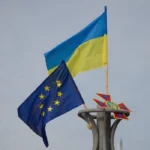The Lithuanian government on Monday called on the European Union to take greater account of the capacities of the Baltic states to support Ukrainian grain exports, after Russia’s recent withdrawal from an agreement that allowed their transport via the Black Sea.
In a letter to the European commissioners, seen by AFP, three Lithuanian ministers considered that the infrastructures of these countries could “serve as a viable and reliable alternative route for the transit of Ukrainian products, including cereals”. According to them, the Baltic infrastructure has a combined annual capacity of 25 million tonnes for grain alone.
The international agreement on the transport of cereals through the Black Sea has meanwhile enabled the export of nearly 33 million tonnes of cereals and other foodstuffs for more than a year, according to the UN.
In order to exploit the potential of the alternative route they propose, the Lithuanian ministers urged the EU to reduce administrative procedures at the Polish-Ukrainian border and to implement them in the Baltic ports from now on.
Last week, five neighboring countries of Ukraine, Poland, Bulgaria, Hungary, Slovakia and Romania, urged the European Union to allow them to extend restrictions they have imposed on Ukrainian grain imports to protect their farmers beyond the September 15 expiry date.
“Either the European Commission agrees to prepare (…) regulations to extend this ban, or we will do it ourselves”, then launched Polish Prime Minister Mateusz Morawiecki, whose country is nevertheless a faithful ally of Ukraine in its war against Russia.
Russian authorities, which have just withdrawn from the key deal on Ukrainian grain exports, have announced that they will consider all ships heading to Ukrainian grain ports in the Black Sea as military targets.
This warning was followed by an intensification of Russian attacks on the Ukrainian region of Odessa. kyiv has accused Russia of targeting grain transportation and critical infrastructure for any resumption of their exports.
Lithuania, a staunch supporter of Ukraine, last week rejected the idea of easing sanctions against Moscow, imposed after its invasion of Ukraine.
This article is originally published on terre-net.fr







